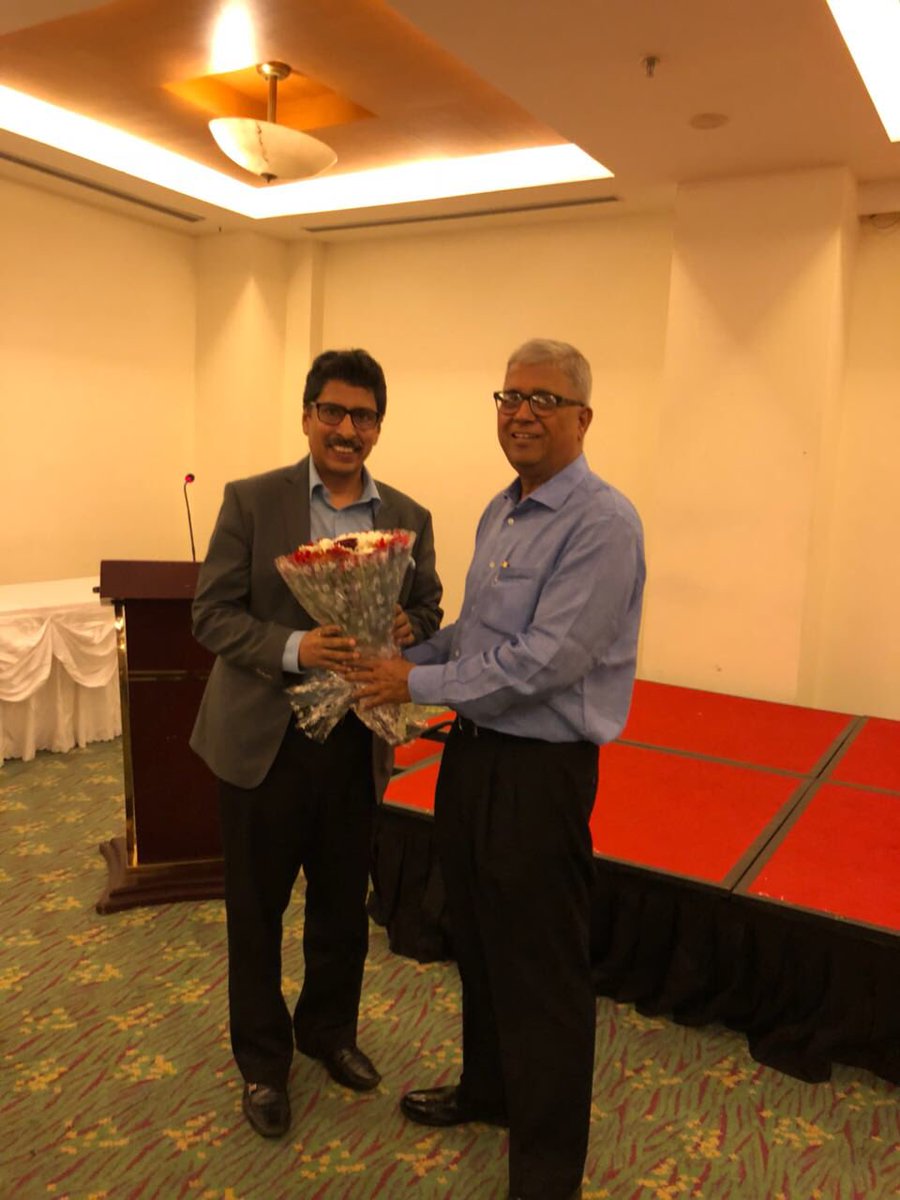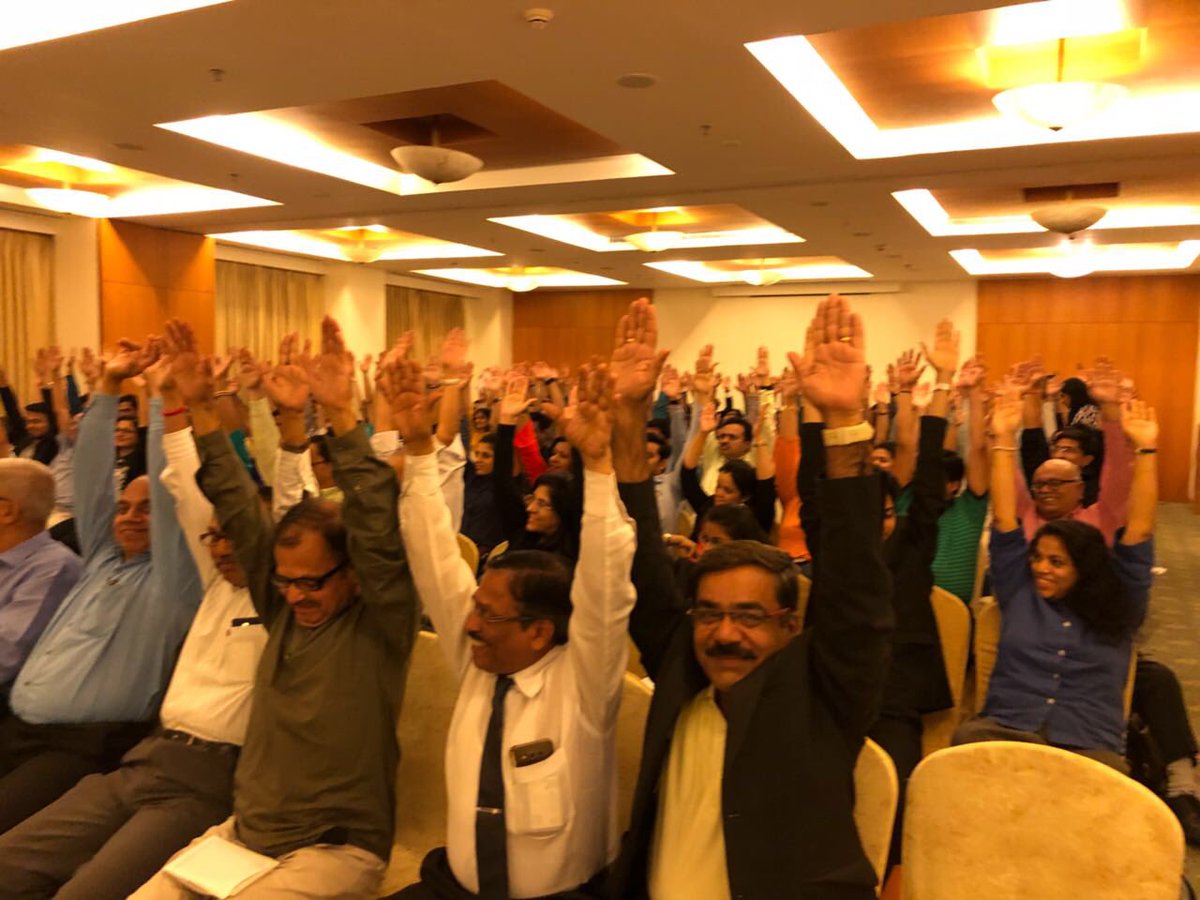When you attend an HR discussion, definitely you add something to your existing knowledge and when you attend a session like Thane HR Group, then you definitely add some more to your knowledge and insight. When there is the speaker like Prabir Jha, you do not need to look behind.
In reservaa.com, this had been our endeavor to create learning opportunity and to make learning accessible to everyone.
We thank you Mr. Anil Kshatriya for making us part of such a great event. The event of January 2018 was such another great event. Mr. Prabir Jha graced the session and the session was houseful. Still, few people were okay to stand up and listen Prabir.
For some people, the topic may not be new, the old things, repeated in the many HR events. But we believe and many of the audience believe, it is not only the subject matter, rather how it is being presented matter.
We know change is inevitable and we should have learning agility (MTHRG or More Than HR Global had organised a full day session on the very topic, again with the houseful audience and excellent learning). As Geeta says, "Parivartan hi sansar ka niyam hai/ The change is the truth in this world)" this equally applies to the job, career and whatever you do in your life.
As the clock rang for 7, the hall jam-packed with the audience anxiously waited to listen Prabir. He was late by few minutes, but such a humility of the leader, he apologized to the audience and explained the bad traffic as a reason. Immediately, he connected the incident with the Uncertain world from the acronym VUCA.
We saw the session already started with the U of the VUCA. There were rest to unfold.
He explained about experiencing the VUCA world: You don't realise the VUCA world unless you step out of your comfort zone. This is exactly what happens when business change, when your boss changes, when business changes and things change around us.
On role of HR in business and its importance
HR is not for business it is a business. It must be more about anticipation rather than reaction.
Biggest challenge: unable to come out, the world is moving faster than before. As an HR we need to understand this Volatility, Uncertainty, Chaos, and Ambiguity. He asked a question to the audience - How much time we spent on anticipation and visualization what is changing around us? It made the audience thoughtful and hardly anyone had an answer for the same.
We see such dilemma against many job seekers, not only in HR at mid-level where cost is higher and opportunities are less. When they go to the job market, most of them don't have the answer about what they have done in their career and later they blame internal hiring, referral hiring and so on.
So, the question is, where is HR losing job in this VUCA world?
No more HR about all old operational Role, we need to reinvent Ourselves. Organisations are outsourcing the operational functions and downsizing HR team hence it is time o relook into our own role.
Why there is VUCA:
He moves among the audience and let them feel he is amongst the audience and let them feel he is one of them. He explains, everything is changing, business model has changed, supply chain network has changed, customer preferences have changed, regulatory norms are changing, nationalist policy like H1B visa, technology is dramatically changing the world, social living, work and talents are dramatically changing - then how can HR confine themselves only to their organization. VUCA is everywhere in the world and HR function has also evolved. He advises on the need to reimagine HR function first to be effective, only brave will survive the new world. Be a brave and that means doing things differently.
He becomes bolder and tell the audience- In VUCA world either you will be irrelevant or you learn to survive
Don't define HR narrowly, the first change is, rethink your ecosystem. He shared his Tata motors experience: classical view about the HR function was managing staff and contract staff, HR used to focus only on the internal staff and on direct payroll staff. Compete focus was on managing them only, understanding their needs only and on regarding them only.What about the dealers who have to actually sell the products, which is the extreme end of generating revenue? What's the point of just focusing on Reward and Recognition at the company level? The dealer bring sales, first work needs to be done is bringing effectiveness at the end I.e. dealer to make them effective as they bring sales and he did that. The dealer does not have effective people, they don't have funds and resources to get a better manpower or to develop them. HR in the VUCA world is all about sensing such gaps.
On HR's role at higher level, beyond HR
HR should be able to influence public policy, the way institute delivers courses but we are not happy about it. How we are able to influence the institutes and policymakers, so create such an environment where the gap between what we expect and what these institutes deliver.
We hate bell curve as we don't like to be called as average performing staff. How we perform above average.
HR is going to be a talent development department. We (HR and organisations) are looking for real talent in the people. He expresses his view on sad quality in the people including HR- most of us are plug and play people. He says- Has found very few true leaders. Definition of talent is moving, changing, you have 20 years experience nobody cares. The question is, does HR know what is talent. In 20 years how many mountains have you moved, what are your deliveries that organizations care to remember? True that mere number of years of experience is not enough.
On Future of HR
HR is going to be a technology-driven function, I don't believe HR is a support function and nobody treated me as a support guy it all depends on what you believe. Why is stereotype happening? We do not have data and ability to read analytics. Analytics play vital role in the HR function. He gives an example of an engineering graduate who has done MBA. In his words- If an engineer does an MBA he does not lose his technical capability?
It is important to understand technology even if we are not expert that's fine. But should be the ability to ask questions.
We don't capture the data that's why we face the issue.
On outbound training and whether they are effective?
The classical system of taking people for outbound training for 3 days is a dead concept. That never works, neither on engaging them nor to make them productive.
Another problem he sees in most of the present HR people are lack of the data, clarity, and ability to influence. When something asked, the standard reply is- "I will get back to you" this has become a sentence now. When HR says this statement, people are not interested.
His advice to HR
Be a consumer of technology and use analytics, skilling up even the 80 years old in 8 weeks is possible.
He stated how HR is losing job in the VUCA world. He Downsized HR by 40% in Cipla. The very simple reason he gives- now we do not need time office in HR exactly the way you don't need cashier in accounts function now. All these are outdated things.
HR is expected to create digital culture, how to create a culture in the new world is a challenge.
In the new information and decision making flow: how HR going to stay relevant in fast decision-making process is very much important.
Disruption happens everywhere and what happens to engagement and how will HR engage talent.
He also criticises HR policies made like manuals. Why do we need all these manuals now? In his view, any policy of more than 1 page is rubbish.
Another important task HR need to take up in the VUCA world is: How will you train managers to motivate each other.
Learning way will change, already changing: micro learning, today's generation doesn't need to go library as this is already available on their laptop. in VUCA world learning changes faster and HR has to understand and adopt that.
Strategic capacity need of organization is important, multiplicative value of learning is important
Irrespective of the role in HR, strategic architect is required, interdisciplinary things will be there and HR will become chief organization officer. When he says interdisciplinary, he advises HR to learn other functions too. He gives an interesting example which we hardly think- Time spent a lot to hire costly machinery but no time is taken to hire person using the machinery. His other advice is:
The world is going to be diffuse, chaotic, paradox, unemployment, war will be intensified for the right talent and HR has to be Marketeer and we will not have second chance to give our performance in tapping right talent.
How you reconnect the dot is very important for HR
Ability to anticipate the dynamic is important
You have to evangelize what is happening in the world, speak out this without fear, start planning anticipating
Get interdisciplinary skills, talk to people beyond HR, earn your credential
Baboodom has gone, business is grey VUCA is grey doesn't look for picture perfect solution
He again reiterates:
HR should have the ability to influence, will never have formal authority yet has influenced more than any other function.
You need to know whom you need to influence. In VUCA world, influencing right person is very important
Your personal reputation in organization and outside organization is very important
Your fundamentals have to be strong
Also, need to be in glamour and glitter helps in influencing
One of the audience, Sumita from Godrej asks a question on succession planning in the VUCA world, he answers:
Long terms planning won't work, it has to be in real world, role may not be relevant in 5 years, it will be multidisciplinary
and with this, another great session ends.
Important announcement:
The next event of Thane HR Group is on 9th February 2018
to register, please visit
To attend such lovely events including Thane HR Group events, keep visiting reservaa.com
An appeal:
Thane HR Group events are free of cost and not a single penny is charged to the audience. Keeping it free for life is a difficult task as there is a cost involved in the rental of premises and food. We request you all to offer your sponsorship and get in direct touch with Mr. Anil Kshatriya, Convenor, and co-founder, Thane HR group at ak@akplacements.com
Happy learning.
About Reservaa: Reservaa.com is a complete learning and development platform who can help you in complete learning and development lifecycle with training need identification/ analysis, right intervention at your cost and budget, ROI and measuring effectiveness. Get in touch with connect-at-reservaa-dot-com for more details.
Our other vertical includes software and application development and HRing- complete hiring services at fraction of a cost.














